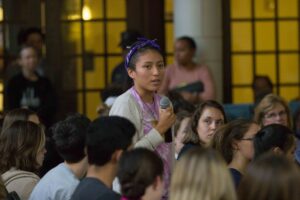by The Cowl Editor on September 28, 2017
Campus
by Thomas Edwards ’20
News Staff

Since the Trump administration announced their intention to end the Deferred Action for Childhood Arrivals policy, DACA has been at the center of the news. On Thursday, September 21, at 4:30p.m. in the Ruane Great Room, the Providence Immigrant Rights Coalition, along with the Office of Institutional Diversity at Providence College and Student Affairs at PC, hosted a DACA discussion panel moderated by Kara Cebulko, associate professor of sociology.
The panel included Javier Juarez, a DACA recipient who currently attends Brown University, Harold W. Pike, Esq., an attorney from Green and Spiegel LLC in Providence, and Jonathan Dator, a licensed psychologist in Rhode Island and current interim associate director of training for personal counseling at PC.
The panel opened with Cebulko giving a brief overview of what DACA was, the events leading up to its creation, and the current immediate aftermath from its removal.
Afterward, Juarez gave a brief overview of his story as a DACA recipient. Prior to DACA, Juarez graduated high school, but since he wasn’t a citizen, he could not attend college. When DACA was initiated in 2012, Juarez was able to get a work permit, earn enough money to put himself through community college, all without financial aid, as DACA recipients are unable to receive Federal Financial Aid. Juarez was able to use the associate’s degree to continue working and further his education and is currently enrolled as a student at Brown University.
As an undocumented immigrant, Juarez said it was “not an option” for him to get a regular job. Rather, it was his responsibility to better himself through education to help his family and his community as a whole. Thanks to DACA, he has been able to work toward that goal so far; however, he now feels uncertain about the future.
Dator was next, and was asked about the mental health impact of removing DACA. Dator told the story of someone he knew by the name of Joaquin before DACA was enacted. Joaquin wanted to be a civil engineer, but, with no opportunity presented to him to achieve this goal because he was undocumented, he saw the future as being hopeless. Eventually, Joaquin committed suicide. Without opportunities, “people feel anxiety, monetary distress, physical distress,” said Dator, and with these added stresses, people like Joaquin are driven to suicide.
After DACA was put into place, according to Dator, studies found that mental health improved in immigrants with the increased opportunity and support provided.
Dator also referenced a Stanford University study published in Science Magazine on Aug. 31 of this year which studied the mental health of children whose parents are recipients of DACA. The study found that children whose mothers were recipients had a lower chance of being diagnosed with a mental disorder.
Pike discussed the legal side of the situation. To be eligible, one must be “under the age of 31, have come to the U.S. before they were 16, lived in the U.S. for five years, no felony or significant misdemeanor convictions, and either be in school or have obtained a degree,” said Pike.
He went on to explain that DACA only granted work permits and protected you from deportation as your information will not be sent to Immigrations and Customs Enforcement (ICE). DACA, Pike explained, “acted like a shield.”
When the audience was given the chance to ask questions or give comments, Father David Orique, O.P, the director of the Latin American Studies program and history professor here at PC, was quick to give the first comment on the stance of the Catholic Church, saying that the act of rescinding DACA was “contrary to divine law to repress the aliens,” said Fr. Orique, referencing the Bible verse which tells us not to repress the aliens in our lands.
He went on to say it went “against natural law to separate families,” and that “Cardinals came out saying it was reprehensible to remove DACA.”